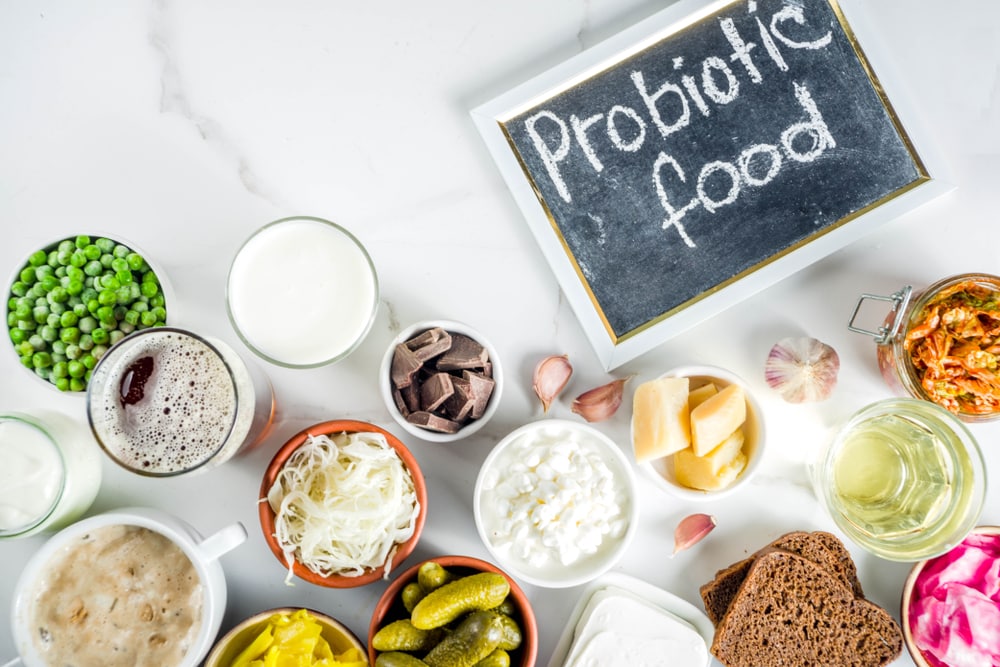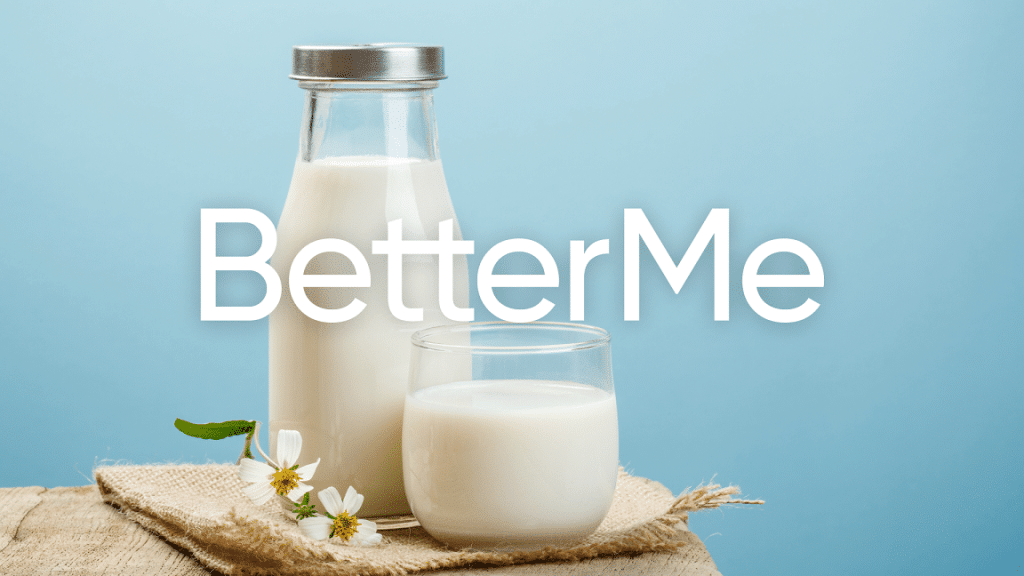If you are unaware of what probiotics are and some of their benefits and someone suggested that you use probiotics for weight loss, you might be surprised and confused. In this article we are going to look into questions related to this topic; questions such as ‘what kind of probiotics for weight loss should you look out for,’ ‘how to use probiotics for weight loss,’ ‘how to take probiotics for weight loss,’ and probiotics for men’s weight loss as well as women’s weight loss’ among others.
Get your personalized
meal plan!
What Are Probiotics?
These are living microorganisms that are intended to have health benefits when consumed or applied to the body (16). They are usually made from a combination of good live bacteria and/or yeasts that naturally live within our bodies.
The human body can have as much as 3 lbs of bacteria at any given time (5). While many of us are weary of bacteria as they can cause disease, it is important to make a distinction between bad and good bacteria. The good bacteria help with (5):
- Setting up checks and balances in the immune system.
- Enabling the breakdown of carbohydrates (sugars) and toxins.
- The absorption of the fatty acids needed for cell growth.
- Repairing of damaged tissues and protecting the cells in your intestines from invading pathogens.
Probiotics for weight loss are made out of good bacteria. On the other hand, bad bacteria are what we should all be weary of. When these bad bacteria disrupt the normal microbiome in the body, it may result in diseases such as cancer, diabetes, cardiovascular disease, and obesity.
The body always has good and bad bacteria, but bad ones are always suppressed by the good ones. The right balance of bacteria in the body is important to prevent inflammation.
When it comes to weight loss, progress is made by inches, not miles, so it’s much harder to track and a lot easier to give up. BetterMe app is your personal trainer, nutritionist and support system all in one. Start using our app to stay on track and hold yourself accountable!
 Which Probiotics Are Best For Weight Loss?
Which Probiotics Are Best For Weight Loss?
If you are wondering what kind of probiotics for weight loss you should invest in, the two most common are bacteria belonging to groups called Lactobacillus and Bifidobacterium. These bacteria are further divided into strains. These different strains have different functions in the body.
For those looking for probiotics for weight loss, the Lactobacillus gasseri is said to be the most effective in reducing weight and belly fat. Here are some animal studies that support this:
- In 2013, a study was done to see how the Lactobacillus gasseri BNR17 strain would affect obese mice. The mice had type II diabetes and were fed a high-sucrose diet for 10 weeks. At the end of the 10 weeks, researchers found that this probiotic significantly reduced body weight in the obese and diabetic mice. They also noticed a reduction of white adipose tissue weight and the levels of leptin and insulin in the mice. They also saw an increase in the levels of fatty acid oxidation-related genes (3).
- In a 2014 study, 6 lab mice were fed a 10%-fat diet containing the Lactobacillus gasseri SBT2055 probiotics strain for 24 weeks. At the end of the study, researchers found that this strain of probiotics had effects on weight loss. It prevented weight gain and fat accumulation in the mice. Furthermore, the Lactobacillus gasseri SBT2055 also reduced triglyceride levels in their bodies (4).
- Another study done in 2013 evaluated the effects of Lactobacillus gasseri NT on lipid metabolism and fat synthesis in a mouse high-fat-diet model. After 13 weeks of this, the results showed that the probiotic reduced fat synthesis in the mice (9).
Lactobacillus And Human Body
How about in humans? What does research say about the use of this strain of probiotics for weight loss? The results have been positive and promising.
- In 2015, a Japanese study revealed that Lactobacillus gasseri SBT2055 increased fat emulsion droplet size, which resulted in the suppression of lipase-mediated fat hydrolysis. Not only does it prevent the absorption of fats in the body, it also helps you pass fat through fecal matter (14).
- In 2010, researchers sought to find out the effects of this same probiotic in abdominal visceral and subcutaneous fat. The study was conducted on 87 subjects all with a higher than normal BMI. Some subjects consumed fermented milk with the Lactobacillus gasseri SBT2055 while the others did not.
At the end of the study, those who had been consuming the fermented milk with the probiotic noticed a reduction in their abdominal visceral and subcutaneous fat areas, BMI, and overall body weight. When their body measurements were taken, they also found that they had lost inches around their waist and hips (20).
- In 2013, another study followed 210 people with significant amounts of belly fat. The test subjects were required to consume fermented milk containing the Lactobacillus gasseri SBT2055.
 Bifidobacterium
Bifidobacterium
After 12 weeks of this, it was found that the probiotic led to a reduction in body weight, fat around organs, body mass index (BMI), waist size, and hip circumference (10). However, it should be noted that once the participants stopped taking the probiotic, most anthropometric measurements almost went back to baseline measurements within 4 weeks.While the Lactobacillus strains are the best probiotics for weight loss, research also shows that some Bifidobacterium strains could also work to combat weight gain (15). One study showed that the Bifidobacterium pseudocatenulatum CECT 7765 strain helps reduce body weight gain, fat mass, plasma glucose and inflammation in diet-induced obese mice.
Bifidobacterium longum was also found to reduce body weight gain, fat mass, insulin resistance, systolic blood pressure, and metabolic endotoxemia in rats(6). In humans, the Bifidobacterium longum led to reduced steatosis, metabolic endotoxemia, insulin resistance, and inflammation in 66 overweight patients with non-alcoholic steatohepatitis (15).
Research on probiotics for women’s weight loss has also shown positive results. A randomized controlled trial done in 2019 looked into the effects of the probiotic Bifidobacterium animalis subsp. lactis CECT 8145 in humans. 135 obese persons participated in the study for 3 months.
Participants who took this probiotic daily for the duration of the trial noticed that they had lost significantly more belly fat and had reduced BMI and waist circumference, compared with those taking a placebo. The interesting thing about the trial is that these results showed were higher in women as compared to the men (8).
Read More: Best Dried Fruit For Weight Loss: Can These Healthy Snacks Keep Hunger At Bay?
 What About Probiotics For Men’s Weight Loss? Should Men Take Probiotics Too?
What About Probiotics For Men’s Weight Loss? Should Men Take Probiotics Too?
Yes, they should because like health, probiotics know no gender. However, probiotics are not a magic pill for weight loss (24). All they do is balance your gut bacteria. They help get rid of unhealthy bacteria, creating an environment with gut diversity that helps in maintaining a healthy weight. Please note that just because probiotics for weight loss will not melt the fat away does not mean that you shouldn’t consider them.
Probiotics, in general, have other incredible benefits such as:
- Alleviating symptoms of bothersome skin conditions like psoriasis, eczema, and rosacea (18).
- Boosting your immune system – They enhance the innate immunity and modulate pathogen-induced inflammation via toll-like receptor-regulated signaling pathways (17).
- Alleviating and curbing allergies and allergy symptoms (2).
- Boosting your mood (1).
If you wish to free yourself from all the extra pounds that have been weighing you down for way too long, start using the BetterMe app and overhaul your entire life!
 Probiotics For Weight Loss Microbiome: How Gut Bacteria Affects Weight Loss?
Probiotics For Weight Loss Microbiome: How Gut Bacteria Affects Weight Loss?
There is way more activity, other than digestion and nutrient absorption, that goes on in our bodies when we eat. A 2018 study showed that gut microbiota and intestinal bacteria have a major role in modulating body weight and energy metabolism. Here is how (3):
-
Production Of Short-Chain Fatty Acids
Once gut microbiota ferments non-digestible polysaccharides, it produces a large amount of SCFAs, namely acetate, propionate, and butyrate. Studies have found that these three are produced by the following specific intestinal bacteria (11).
- Acetate specifically is produced by most of the enteric bacteria such as Lactobacillus spp., Bifidobacterium spp., Akkermansia muciniphila, Bacteroides spp., Prevotella spp., Ruminococcus spp., and Streptococcus spp.
- Propionate is produced by Phascolarctobacterium succinatutens, Bacteroides spp., Dialister spp., Megasphaera elsdenii, Veillonella spp. Coprococcus catus, Roseburia inulinivorans, Ruminococcus obeum, Salmonella spp.
- Butyrate is produced by Roseburia spp. Eubacterium rectale, Clostridium leptum, Eubacterium hallii, Coprococcus eutactus, Faecalibacterium prausnitzii, Eubacterium rectale, Anaerostipes caccae, and Coprococcus catus
Acetate affects body weight in that it helps control our appetite, produces satiety hormones making us feel full and improves lipid metabolism and energy expenditure (i.e. calorie burning) (23). Propionate contributes to weight control by increasing the levels of PYY, GLP-1, and leptin, decreases serum cholesterol levels and liver lipogenesis, and inducing satiety.
Butyrate is said to prevent increases in body weight without altering food intake or energy expenditure. It improves insulin sensitivity and decreases the respiratory exchange ratio (12). A 2018 review concluded that diet supplementation with synbiotics prepared using selected strains has a significant impact in exert weight-reduction and anti-inflammatory activity in the body.
A combination of probiotics such as Lactobacillus gasseri and prebiotics like galactomannan and/or inulin fibers can lead to better weight management as the boost the production of short chain fatty acids and microbiota ‘re-configuration’ (19).
Bile acids are the end products of cholesterol catabolism. Bacterial bile salt hydrolases (BSH) are produced by various microbial species, including those in the Lactobacillus, Bifidobacterium, Enterococcus, and Clostridium genera.
An increase or decrease of these bile salts affects body weight through nuclear farnesoid X receptor and G-protein-coupled bile acid receptor 1 mediated mechanisms. These two factors usually affect weight gain or loss through energy homeostasis, bile acid homeostasis, and glucose metabolism.
Read More: 2 Day Fast For Weight Loss: A Simple Metabolism-Boosting Technique
-
Induction Of Metabolic Endotoxemia
Metabolic endotoxemia occurs when a person’s microbiome in the gut fails to protect the body from absorbing toxins during the digestion of a meal or snack. When the bad gut bacteria increase and the good bacteria decrease, it leads to metabolic disturbances which may cause glucose intolerance, hepatic insulin resistance, and fat deposit.
How To Use Probiotics For Weight Loss?
Should you take probiotics everyday? Unless you are experiencing specific GI symptoms that would benefit from the replacement of your good bacteria, it is unnecessary as you can get most of the probiotics you need through the food you eat. They are unlike multivitamins and should be taken with caution (21). According to Harvard Medical School, most probiotics in the market are not monitored by the FDA; that means that you can never truly be sure if the probiotic you have purchased is well-studied and of high-quality or not (22).
For you to best understand how to use probiotics for weight loss – and if you actually need them – please talk to your doctor or dietitian.
 How To Take Probiotics For Weight Loss?
How To Take Probiotics For Weight Loss?
Before rushing to the nearest pharmacy to get some over the counter probiotics for weight loss, look closer to home. You can get probiotics from fermented foods such as kefir, sauerkraut, kombucha, fermented or raw cheeses, raw apple cider vinegar (with the mother), kimchi (fermented cabbage), natto, miso, or tempeh.
What Probiotics Are Bad For Weight Loss?
A comparative meta-analysis done in 2012 (7) showed that the probiotic strains Lactobacillus fermentum and Lactobacillus ingluviei cause weight gain in animals.
Can You Use Probiotics And Digestive Enzymes For Weight Loss?
They could be useful. As we have seen above, probiotics works within the body to help combat weight gain in several ways. On the other hand, digestive enzymes help break down proteins, fats, carbohydrates and other nutrients into smaller components. While digestive enzymes may not directly boost weight loss, digestive enzyme inhibitors might. They decrease the absorption of certain macronutrients which can lead to weight loss and fat loss (8).
The Bottom Line: Do Probiotics For Weight Loss Work?
Depending on the specific strain, probiotics for weight loss may help you lose some weight. That being said, they are not a magical pill that will cause drastic weight loss results. Sustainable weight loss is only achieved through exercise and a well-balanced diet. If you are considering getting some probiotics for weight loss, please be sure to consult your doctor or dietitian first before making and decisions.
DISCLAIMER:
This article is intended for general informational purposes only and does not address individual circumstances. It is not a substitute for professional advice or help and should not be relied on to make decisions of any kind. A licensed physician should be consulted for diagnosis and treatment of any medical conditions. Any action you take upon the information presented in this article is strictly at your own risk and responsibility!
SOURCES:
- A randomized controlled trial to test the effect of multispecies probiotics on cognitive reactivity to sad mood (2015, sciencedirect.com)
- Allergies? Probiotic combination may curb your symptoms, new study finds (2017, sciencedaily.com)
- Anti-obesity effect of Lactobacillus gasseri BNR17 in high-sucrose diet-induced obese mice (2013, pubmed.ncbi.nlm.nih.gov)
- Anti-obesity effect of Lactobacillus gasseri SBT2055 accompanied by inhibition of pro-inflammatory gene expression in the visceral adipose tissue in diet-induced obese mice (2014, pubmed.ncbi.nlm.nih.gov)
- Bacteria: the Good, the Bad, and the Ugly (n.d., center4research.org)
- Bifidobacterium longum supplementation improved high-fat-fed-induced metabolic syndrome and promoted intestinal Reg I gene expression (2011, journals.sagepub.com)
- Comparative meta-analysis of the effect of Lactobacillus species on weight gain in humans and animals (2012, sciencedirect.com)
- Do Digestive Enzymes Promote Weight Loss? (2020, healthline.com)
- Effects of daily consumption of the probiotic Bifidobacterium animalis subsp. lactis CECT 8145 on anthropometric adiposity biomarkers in abdominally obese subjects: a randomized controlled trial (2019, pubmed.ncbi.nlm.nih.gov)
- Effect of Lactic Acid Bacteria on Lipid Metabolism and Fat Synthesis in Mice Fed a High-fat Diet (2013, pubmed.ncbi.nlm.nih.gov)
- Effect of Lactobacillus gasseri SBT2055 in fermented milk on abdominal adiposity in adults in a randomised controlled trial (2013, pubmed.ncbi.nlm.nih.gov)
- Gut Microbiota, Short-Chain Fatty Acids, and Herbal Medicines (2018, ncbi.nlm.nih.gov)
- Is It Time to Use Probiotics to Prevent or Treat Obesity? (2018, ncbi.nlm.nih.gov)
- Lactobacillus gasseri SBT2055 suppresses fatty acid release through enlargement of fat emulsion size in vitro and promotes fecal fat excretion in healthy Japanese subjects (2015, pubmed.ncbi.nlm.nih.gov)
- Losing weight for a better health: Role for the gut microbiota (2016, sciencedirect.com)
- Probiotics: What You Need To Know (2019, nccih.nih.gov)
- Probiotics and immune health (2014, ncbi.nlm.nih.gov)
- Probiotics Hold Promise for 4 Skin Conditions (2014, livescience.com)
- Probiotics, prebiotics and synbiotics for weight loss and metabolic syndrome in the microbiome era (2018, pubmed.ncbi.nlm.nih.gov)
- Regulation of abdominal adiposity by probiotics (Lactobacillus gasseri SBT2055) in adults with obese tendencies in a randomized controlled trial (2010, pubmed.ncbi.nlm.nih.gov)
- Should You Take a Probiotic Every Day? (n.d, cspinet.org)
- Should you take probiotics? (2019, .health.harvard.edu)
- The Short-Chain Fatty Acid Acetate in Body Weight Control and Insulin Sensitivity (2019, ncbi.nlm.nih.gov)
- Why Probiotics Aren’t a Magic Pill for Weight Loss (2019, menshealth.com)













